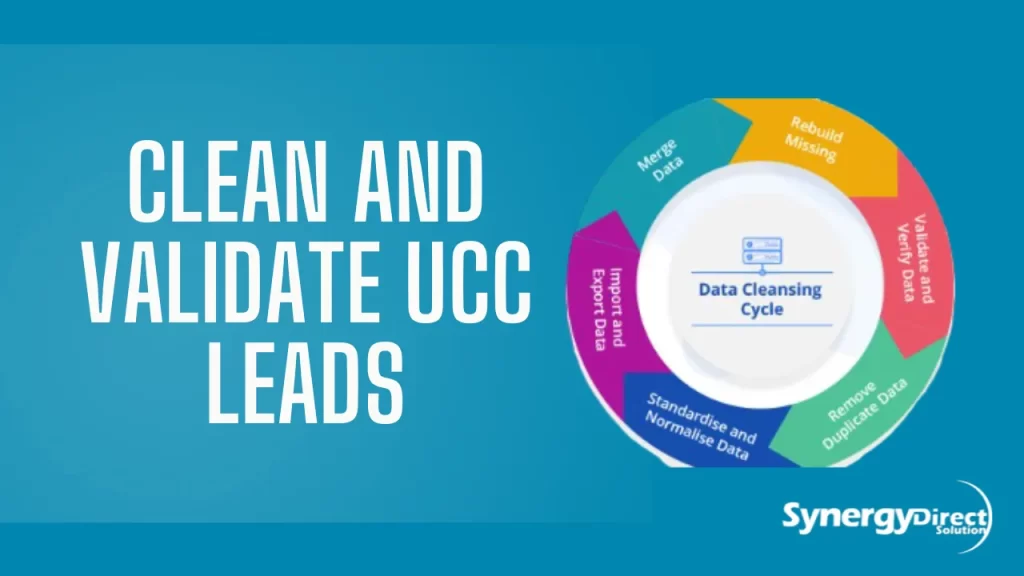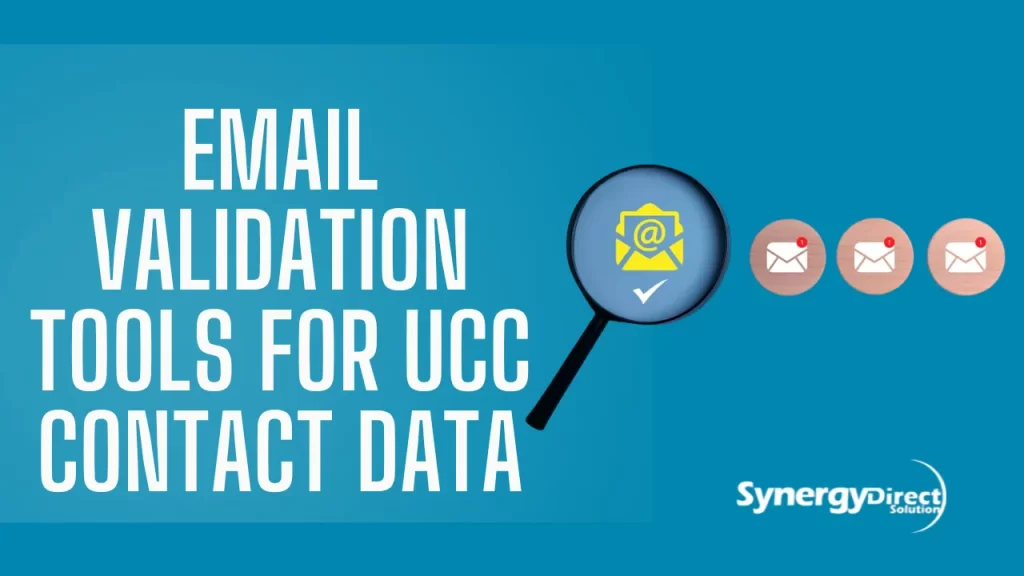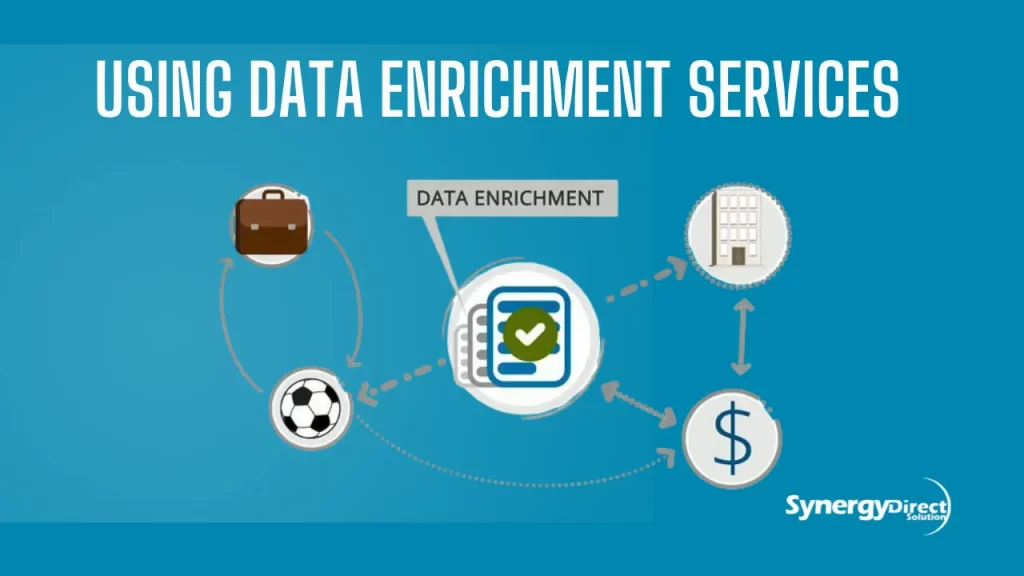How to Clean and Validate UCC Leads Effectively for Better Conversion
In the world of B2B sales and finance, UCC leads (Uniform Commercial Code leads) are a valuable resource. These leads provide insight into businesses that have used collateral to secure loans, making them prime targets for lenders, factoring companies, and service providers.
However, raw UCC data is often messy, outdated, or incomplete. To make it actionable, you must clean and validate your UCC leads before using them in any sales or marketing strategy.
This blog will provide a step-by-step guide on how to clean and validate UCC leads effectively, helping you improve your lead quality, reduce bounce rates, and increase your conversion potential.

How to Clean and Validate UCC Leads Without Compromising Data Quality
Cleaning and validating UCC (Uniform Commercial Code) leads is essential for ensuring accuracy and compliance in financial and business operations. Without compromising data quality, this process involves removing duplicates, correcting formatting errors, and verifying business information against reliable databases.
Instead of relying solely on automated tools that may overlook context-specific nuances, manual review combined with intelligent data parsing can enhance precision. Furthermore, using data enrichment methods like cross-referencing with government records, business directories, or credit databases ensures the legitimacy of each lead.
Regular audits and consistency checks also help maintain a high standard of data hygiene. By following these steps, businesses can improve lead conversion rates while safeguarding the integrity of their UCC lead database.
How to Clean and Validate UCC Leads Online
Cleaning and validating UCC leads online involves using digital tools and cloud-based platforms to streamline data accuracy and improve lead quality. Start by uploading your lead list to a trusted online data cleaning service that offers features like duplicate detection, format normalization, and error correction.
Many platforms also integrate with public UCC filing databases and business registries, allowing you to automatically cross-check and validate company names, filing dates, and legal statuses. Email verification tools and CRM integrations can further enhance the accuracy of contact information linked to each UCC filing.
Always ensure the platform complies with data protection laws to maintain security and privacy. By leveraging these online resources, businesses can efficiently process large volumes of UCC leads while maintaining high data integrity.
Removing Duplicates and Outdated Entries
One of the most important steps in cleaning and validating UCC leads is removing duplicates and outdated entries, as these can lead to inaccurate reporting and wasted outreach efforts. Duplicates often arise when the same lead is entered multiple times with slight variations in spelling, formatting, or contact details.
To identify these, use data deduplication tools or advanced spreadsheet functions like conditional formatting, unique filtering, or fuzzy matching. Once identified, consolidate duplicate entries to preserve the most accurate and up-to-date information.Outdated entries, such as leads associated with businesses that are no longer active or filings that have expired, should be regularly reviewed and purged from your database.
This can be done by cross-referencing your leads with current UCC filing databases or using online validation tools that monitor the status of businesses in real time. Removing these irrelevant entries ensures your sales and marketing efforts are focused on active, relevant leads, ultimately improving conversion rates and operational efficiency.
Email Validation Tools for UCC Contact Data
Ensuring the accuracy of email addresses in UCC (Uniform Commercial Code) contact data is crucial for maintaining reliable communication and avoiding costly errors. Email validation tools play a vital role in verifying and cleaning email lists by checking for syntax errors, domain authenticity, and whether an email address is deliverable or not.
These tools help eliminate invalid, fake, or outdated email addresses, reducing bounce rates and improving outreach efficiency. For organizations handling UCC filings, where precision in contact information is essential for legal and financial correspondence, email validation ensures compliance and enhances data quality.
Advanced validation platforms often offer bulk verification, real-time API integration, and comprehensive reporting, making them indispensable in managing large-scale UCC databases. By implementing these tools, businesses can protect their sender reputation, increase engagement rates, and maintain up-to-date contact records for UCC filings.

Best Data Providers for Clean UCC Leads
Finding reliable and clean UCC (Uniform Commercial Code) leads is essential for businesses targeting companies in need of financial services, equipment leasing, or working capital. Clean UCC leads provide verified information on companies that have recently filed UCC financing statements, making them prime candidates for new lending opportunities. The best data providers in this niche focus on delivering up-to-date, filtered, and accurate contact details to maximize outreach success and minimize wasted effort.
Top-tier UCC lead providers like UCCData.com, InfoUSA, LeadsPlease, Data Axle, and Salesgenie are known for offering regularly refreshed datasets, high-quality contact information, and segmentation options such as geography, industry, loan amount, and filing type. These platforms often include advanced filtering tools that allow businesses to target specific borrower profiles based on recent filing dates or creditor types. Additionally, many of these providers integrate with CRM systems, enabling seamless lead management and real-time tracking.
By choosing reputable data providers, companies can access clean, actionable UCC leads that support efficient sales pipelines, reduce compliance risks, and boost conversion rates. A strong lead provider not only supplies accurate data but also helps businesses maintain the integrity of their outreach strategies through regular updates and email validation.
Effective Methods for Validating UCC Leads and Ensuring Accuracy
Validating UCC (Uniform Commercial Code) leads is a critical process for businesses that rely on accurate and reliable data for financial transactions, compliance, and decision-making. Ensuring that UCC leads are accurate and valid can significantly reduce the risk of errors and financial loss. Below are some effective methods for validating UCC leads and ensuring their accuracy.
1. Cross-Referencing with Official UCC Filings
One of the primary methods for validating UCC leads is to cross-reference the information provided with official UCC filings. UCC records are publicly accessible through the UCC filing system in each state. By checking the lead information against these filings, you can verify:
- Entity names and details: Ensure the business or individual listed is registered and the details match.
- Collateral details: Confirm that the correct collateral is tied to the UCC filing.
- Filing dates: Validate that the filing date corresponds with the transaction timeline.
This method provides a reliable source of truth and helps avoid fraudulent or outdated leads.
2. Utilizing UCC Search Tools and Databases
Many third-party services offer UCC search tools and databases that compile filings from various jurisdictions. Using these services allows you to perform an in-depth search to validate lead information, including:
- State-specific searches: Search across individual states or nationally for more comprehensive validation.
- Cross-state verification: Ensure that multi-jurisdictional filings are accurately captured.
- Lead information verification: Check for discrepancies between the lead’s data and official records.
These tools streamline the validation process, making it more efficient.
3. Contacting the UCC Filing Office Directly
When in doubt, contacting the UCC filing office directly is a method to ensure that the lead information is correct. You can request a certificate of good standing or additional details on a particular UCC filing. This method is particularly useful when the online data is unclear or incomplete.
4. Verifying Legal and Business Information
In addition to UCC-specific data, validating the legal and business information of the lead can help ensure accuracy. This includes:
- Checking the business registration: Verify that the business is properly registered with the appropriate state authority.
- Reviewing the company’s financial standing: Ensure the lead is financially stable by reviewing their business credit score or financial statements, if available.
- Confirming identity: Use other identity verification tools to ensure that the lead is legitimate, especially for individual UCC filers.
By validating this supporting information, you can ensure that the lead is both legally and financially credible.
5. Using Data Enrichment Services
Data enrichment services can be used to supplement the lead’s information. These services help fill in any gaps in the data and provide additional context by cross-referencing with external databases. For example:
- Address validation: Ensure that the lead’s business address is correct and up-to-date.
- Contact information verification: Validate phone numbers and email addresses.
- Background checks: For individuals, perform background checks to validate their identity.

These services provide a more thorough validation and improve the overall quality of the leads.
6. Monitoring UCC Filings for Changes
Once a lead is validated, it’s essential to continuously monitor their UCC filings for any updates or changes. This is especially important in high-risk industries or when dealing with businesses in fluctuating financial conditions. By staying informed of changes to UCC filings, you can ensure that your leads remain accurate over time.
7. Implementing Automation and AI Tools
Automation and AI tools can enhance the lead validation process by streamlining data collection, validation, and cross-referencing. These tools can scan large volumes of UCC filings quickly, flag discrepancies, and offer predictive analytics to identify potential risks in your leads. Additionally, machine learning algorithms can improve the accuracy of future validations as they learn from previous data.
Conclusion
In conclusion, cleaning and validating UCC leads is a crucial step in maintaining a reliable and effective sales pipeline. By utilizing a combination of manual review, automated tools, and third-party services, businesses can ensure the accuracy, relevance, and timeliness of their UCC leads. Whether through cross-referencing official filings, verifying legal and business information, or using data enrichment and automation tools, a comprehensive approach to lead validation can significantly improve conversion rates and reduce the risk of wasted efforts or financial loss. With consistent monitoring and regular updates, companies can maintain the integrity of their UCC lead database, ensuring high-quality leads that drive successful outcomes.
FAQS
1. Why is cleaning and validating UCC leads essential for businesses?
Cleaning and validating UCC leads is crucial because it ensures the accuracy, relevance, and timeliness of the data. Invalid, outdated, or duplicate leads can lead to wasted resources, low conversion rates, and compliance issues. By cleaning and validating UCC leads, businesses can improve their targeting, reduce bounce rates, and increase their chances of successful outreach, ultimately enhancing their sales pipeline and reducing financial risks.
2. What tools can be used to clean and validate UCC leads effectively?
To clean and validate UCC leads, businesses can use a combination of tools, including:
- Data Cleaning Services: These platforms offer features like duplicate detection, error correction, and format normalization.
- Email Validation Tools: These verify the authenticity and deliverability of email addresses, ensuring communication is reliable.
- UCC Search Tools: Third-party services that cross-reference UCC filings across states, helping to validate entity details and collateral information.
- Data Enrichment Services: These tools provide additional context by cross-referencing external databases, improving lead quality.
